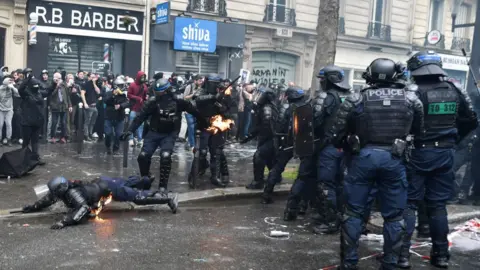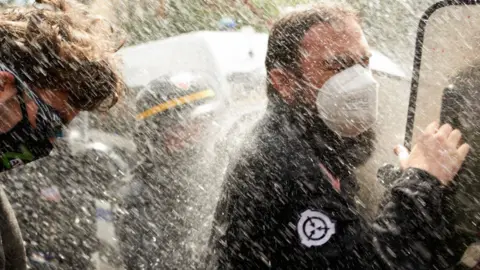France protests: More than 100 police hurt in May Day demonstrations
At least 108 police officers have been injured in clashes across France with protesters angry at pension reforms, the interior minister has said.
Gérald Darmanin said such a large number of police wounded was extremely rare, adding that 291 people had been arrested during the unrest.
Hundreds of thousands have been taking part in May Day demonstrations against President Emmanuel Macron's reforms.
Most were peaceful but radical groups threw petrol bombs and fireworks.
Police responded with tear gas and water cannon.
It is not clear how many protesters have been injured.
Prime Minister Élisabeth Borne tweeted that the violence was "unacceptable", while also praising the "responsible mobilisation and commitment" of demonstrators in numerous cities.
This is the latest day of mass action against changes that raise the state pension age from 62 to 64. Trade unions want them withdrawn.
The Interior Ministry put the overall number of demonstrators at 782,000, including 112,000 in the capital Paris, but the CGT union say the figure is three times that number.
Union leaders were adamant that months-long opposition to the reforms was not waning.
"The page is not going to be turned as long as there is no withdrawal of this pension reform. The determination to win is intact," said CGT leader Sophie Binet, quoted by AFP.
In Paris, one police officer suffered serious burns to his hands and face when struck by a petrol bomb, Mr Darmanin said.
Violence also broke out in Lyons, Toulouse and Nantes, where vehicles were set on fire and businesses attacked.
 Getty Images
Getty ImagesThere were also reports that protesters briefly occupied a luxury hotel in the southern city of Marseille. Monday was the first time since 2009 that France's top eight trade unions had backed calls for a protest, AFP news agency said.
Mr Darmanin accused far-left groups known as black blocs and numbering a few thousand of being behind the violence and urged that "those who attacked the police and public property be severely punished".
There has been a violent element to the protests ever since March, when the government decided to force the legislation through the lower house of parliament - where it lacks an absolute majority - without a vote.
Mr Macron says the reform is a necessity.
He signed the reform into law on 15 April, hours after France's Constitutional Council broadly backed the changes, but opinion polls show a large majority of the population opposes the higher pension age.
The reforms are expected to come into force by September.
The government has promised further talks but the unions are determined to get the changes repealed, and it is not clear where a compromise could be found.
 Getty Images
Getty Images